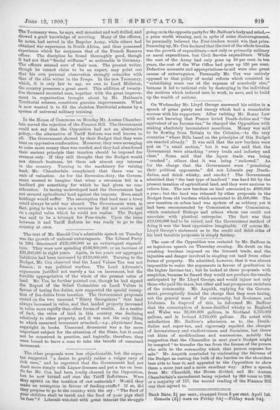In the House of Commons on Monday Mr. Austen Chamber-
lain moved the rejection of the Finance Bill. The Government could not say that the Opposition had not an alternative policy,—the alternative of Tariff Reform was well known to all. The Government showed by their Budget that they were bent on oppressive confiscation. Moreover, they were arranging to raise more money than was needed, and they had abandoned their ancient principle that taxation should be imposed for revenue only. If they still thought that the Budget would llot disturb bueiness, let them ask almost any interest in the country. Turning to the machinery for valuing land, Mr. Chamberlain complained that there was no Milt of valuation. As for the Reversion-duty, the Govern- ment seemed to imagine that when a reversion fell in a landlord get something for which he had given no con= eideration. In taxing undeveloped land the Governinent had not secured agricultutal land against the imposts. Even small holdings would suffer. The assumption that land near a town always be sold was absurd. The Government were, in fact, going to tax a man on a revenue he did not receive and on a capital value which he could not realise. The Budget *as said to be a triumph for Free-trade. Upon the issue between it and Tariff Reform he was ready to go to the country at once.










































 Previous page
Previous page